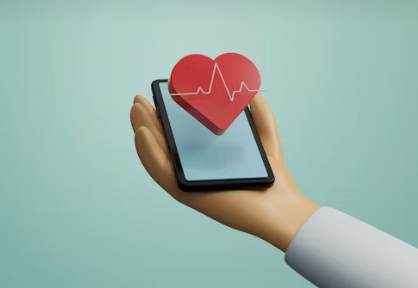Is your phone the key to detecting Parkinson’s or Dementia early? New tech now available across the US
- Replies 1
Disclaimer: The information provided in this article is for educational purposes only and is not intended as a substitute for professional medical advice, diagnosis, or treatment. Always consult your physician or other qualified healthcare providers with any questions you may have regarding a medical condition or before making any changes to your health regimen.
Imagine if your everyday smartphone—yes, the one you use to call the grandkids, check the weather, or play a quick game of solitaire—could also help detect the earliest signs of Parkinson’s disease or dementia.
But now, it’s being tapped for something much more significant. A tech company overseas has developed a platform that turns this ordinary item into a powerful health monitor.
And after years of research, it’s finally being rolled out to Americans.
Neu Health has just launched its innovative smartphone-based platform in the US, aiming to transform how we detect and manage neurological conditions like Parkinson’s and dementia.
The big news? The platform’s “tremor measurement” module has received FDA clearance, making it the first of its kind to accurately quantify motor symptoms in adults with mild to moderate Parkinson’s—using nothing more than a regular smartphone.

The magic lies in the phone’s built-in sensors and some seriously smart algorithms.
Here’s how it works: Patients are guided through a series of short, simple tasks at home—think speaking a few sentences, tapping the screen, moving the phone, or recalling words.
While you’re doing these activities, the phone’s sensors are quietly collecting data on your speech, movement, memory, and cognitive function.
This data is then analyzed by Neu’s algorithms, which have been trained on over a decade of real-world Parkinson’s data.
The result? The platform generates “digital biomarkers” and predictive scores that can reveal subtle changes in brain health—often long before they’d be noticed in a typical doctor’s visit.
As Dr. Kinan Muhammed, Neu’s Chief Medical Officer, explains, “People often overlook voice or gait changes because they assume they’re minor, but they’re among the earliest and most actionable signals of neurological decline.”
By tracking these subtle shifts over time, Neu’s platform can help doctors and families anticipate changes, personalize treatment, and reduce the burden on everyone involved.
For many, the traditional approach to brain health has been reactive—waiting until symptoms are obvious before taking action. But as Neu Health CEO Caroline Cake puts it, “We can no longer wait for accidents to happen to justify the next level of care for our loved ones.”
With Neu’s platform, care can become proactive, catching issues early and supporting patients and families every step of the way.
Also read: Could a dog help detect Parkinson’s years before symptoms appear? New research shows promise
Neu’s technology isn’t just a flash in the pan. It’s been validated through more than ten years of research and real-world use in the UK’s National Health Service (NHS).
Studies published in respected journals like Neurology and the Journal of Neurology, Neurosurgery & Psychiatry show that Neu’s digital assessments can spot neurological changes up to 18 months earlier than traditional methods.
The platform is already being used at major US medical centers, including Mass General Brigham, and Neu is working to expand access—especially in rural and underserved communities where seeing a neurologist can be a real challenge.
Also read: Could this simple at-home test reveal hidden cancer before it's too late?
Neu Health is now partnering with US health systems and insurance providers to make this technology available to as many people as possible.
As the platform rolls out across the country, we could see a major shift in how neurological conditions are detected, managed, and understood.
Read next: Could this 14-year-old’s app save your life? Instantly detect early heart failure in just 7 seconds

Have you or a loved one faced challenges with Parkinson’s, dementia, or other neurological conditions? Would you feel comfortable using your phone for health monitoring? Do you think this kind of technology could help you or your family?
Imagine if your everyday smartphone—yes, the one you use to call the grandkids, check the weather, or play a quick game of solitaire—could also help detect the earliest signs of Parkinson’s disease or dementia.
But now, it’s being tapped for something much more significant. A tech company overseas has developed a platform that turns this ordinary item into a powerful health monitor.
And after years of research, it’s finally being rolled out to Americans.
Neu Health has just launched its innovative smartphone-based platform in the US, aiming to transform how we detect and manage neurological conditions like Parkinson’s and dementia.
The big news? The platform’s “tremor measurement” module has received FDA clearance, making it the first of its kind to accurately quantify motor symptoms in adults with mild to moderate Parkinson’s—using nothing more than a regular smartphone.

No fancy wearables, no special gadgets, just the phone you already own. Image source: Getty Images / Unsplash
The magic lies in the phone’s built-in sensors and some seriously smart algorithms.
Here’s how it works: Patients are guided through a series of short, simple tasks at home—think speaking a few sentences, tapping the screen, moving the phone, or recalling words.
While you’re doing these activities, the phone’s sensors are quietly collecting data on your speech, movement, memory, and cognitive function.
This data is then analyzed by Neu’s algorithms, which have been trained on over a decade of real-world Parkinson’s data.
The result? The platform generates “digital biomarkers” and predictive scores that can reveal subtle changes in brain health—often long before they’d be noticed in a typical doctor’s visit.
As Dr. Kinan Muhammed, Neu’s Chief Medical Officer, explains, “People often overlook voice or gait changes because they assume they’re minor, but they’re among the earliest and most actionable signals of neurological decline.”
By tracking these subtle shifts over time, Neu’s platform can help doctors and families anticipate changes, personalize treatment, and reduce the burden on everyone involved.
For many, the traditional approach to brain health has been reactive—waiting until symptoms are obvious before taking action. But as Neu Health CEO Caroline Cake puts it, “We can no longer wait for accidents to happen to justify the next level of care for our loved ones.”
With Neu’s platform, care can become proactive, catching issues early and supporting patients and families every step of the way.
Also read: Could a dog help detect Parkinson’s years before symptoms appear? New research shows promise
Neu’s technology isn’t just a flash in the pan. It’s been validated through more than ten years of research and real-world use in the UK’s National Health Service (NHS).
Studies published in respected journals like Neurology and the Journal of Neurology, Neurosurgery & Psychiatry show that Neu’s digital assessments can spot neurological changes up to 18 months earlier than traditional methods.
The platform is already being used at major US medical centers, including Mass General Brigham, and Neu is working to expand access—especially in rural and underserved communities where seeing a neurologist can be a real challenge.
Also read: Could this simple at-home test reveal hidden cancer before it's too late?
Neu Health is now partnering with US health systems and insurance providers to make this technology available to as many people as possible.
As the platform rolls out across the country, we could see a major shift in how neurological conditions are detected, managed, and understood.
Read next: Could this 14-year-old’s app save your life? Instantly detect early heart failure in just 7 seconds
Key Takeaways
- British startup Neu Health has launched its smartphone-based platform for detecting and managing Parkinson’s disease and dementia in the US, enabling any phone to become a clinical-grade tool for assessing neurological health.
- The platform’s “tremor measurement” module has received FDA clearance, allowing it to quantify motor symptoms in Parkinson’s patients using just a smartphone—no wearables or specialized equipment required.
- Patients complete simple tasks at home through the app, with the phone’s sensors and specialized algorithms analyzing changes in speech, motor skills, and memory to detect early, subtle indicators of neurological decline.
- Neu Health’s technology aims to make neurological care more proactive and accessible, especially in rural or underserved areas, with early UK trials suggesting it can detect changes up to 18 months earlier than traditional assessments.






